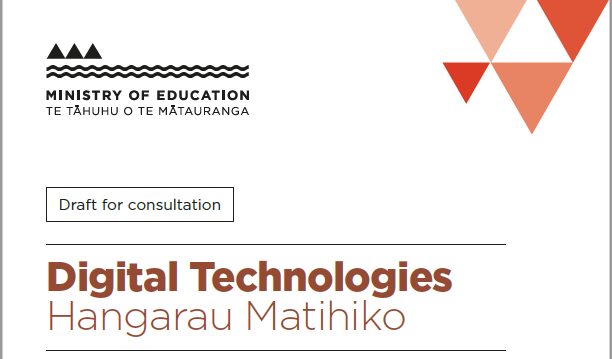Digital Technologies in the New Zealand Curriculum
This is a personal blog, so I should probably begin this post by stating that the opinions expressed here are entirely mine and do not necessarily reflect the views of my employer.
The New Zealand Ministry of Education recently began a consultation process on their proposals for a new digital curriculum in schools. Two parts of this curriculum in particular are up for discussion, and some details have been provided about these; Computational Thinking for Digital Technologies and Designing and Developing Digital Outcomes. Reading the descriptions of the proposed progress outcomes and outcome statements for students at different age levels under Computational Thinking for Digital Technologies I couldn’t help feeling that I was in something of a time warp. It reminded me of recently being sent a copy of a Cambridge computing exam for the UK GCSE. I first taught this topic in London in 1988 when GCSE was new, and looking at the exam questions the only significant difference I could find was some reference to the World Wide Web, which of course did not exist in 1988, and one rather grudging mention of mobile phones.
A similar sense of deja vu came to me looking at the proposed progress outcomes for computational thinking in the curriculum. Yes, there were algorithms and binary digits and input and output and software engineering methodologies, oh and of course sequence, selection, iteration etc., all those components that were so familiar in the 1980s. What I did not see so much of was components, patterns, frameworks, productivity tools and code automation, models, teams, customer interaction, iterative agile and lean processes, anything in fact from the last quarter century or so of software development. True, there is a sprinkling of contemporary computing terms such as big data, visual computing and artificial intelligence (not that this is particularly new) but underneath it all is some pretty old thinking.
Of course there is also the curriculum for Designing and Developing Digital Outcomes. You might say that I am looking in the wrong place for the content above. To be fair, this part of the curriculum proposal starts well; “Students understand that digital applications and systems are created for humans by humans”, but very soon sinks into topics such as patents, file types and network protocols. These are, of course, useful and important things, but I do feel that the broad understanding of digital systems that supports digital fluency for all students (not just the budding computer scientists) is rather lost in the mix.
I also wonder who is going to be teaching all of this in schools. How many teachers do we have in New Zealand who are well versed in 1980s style computer science? Some years ago I ran a session in an Auckland school for a group of digital technology secondary teachers from around the area. It became clear very quickly that all of these teachers had very different skill sets. They focused on particular tools and approaches, which were very diverse. This is not necessarily a bad thing, but it may be a challenge to implement such a curriculum with such a broad palette of experience and delivery in the available staff.
I would like to make it clear that I applaud the Ministry of Education for tackling the issue of the digital curriculum, and I wish them well in the journey towards making our students more digitally and computationally aware and capable. I hope that the current process of consultation and investment leads to great outcomes for everyone. As well as expressing my personal opinion in this blog, I have also shared my views through the online survey tool for the Digital Technologies | Hangarau Matihiko curriculum content consultation process, and I hope that other experienced educators, researchers and IT professionals will do the same. It is only by engaging in informed debate that we can get the best outcomes for future students.
